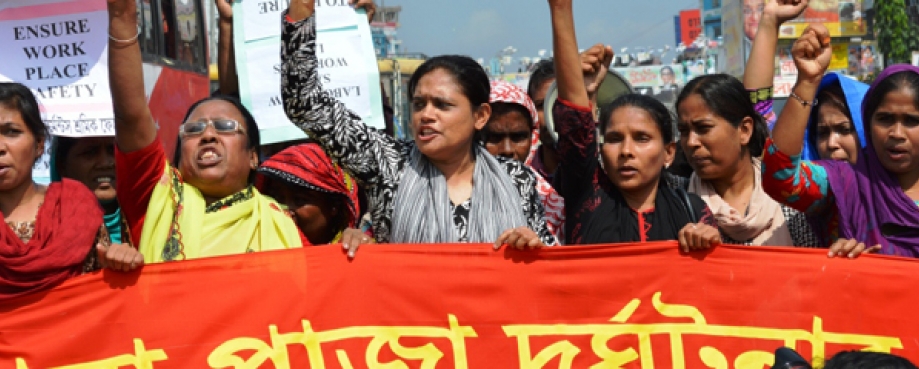
Today it is six months since the Rana Plaza collapse, with the deaths of 1,127 workers and nearly 2,000 workers injured. There will be demonstrations in Bangladesh and some European cities. By coincidence, people in Wales were last week commemorating the centenary of the Senghenydd Colliery Disaster, that killed 439 miners and one rescuer
1024x768
Normal
0
false
false
false
EN-GB
X-NONE
X-NONE
/* Style Definitions */
table.MsoNormalTable
{mso-style-name:"Table Normal";
mso-tstyle-rowband-size:0;
mso-tstyle-colband-size:0;
mso-style-noshow:yes;
mso-style-priority:99;
mso-style-qformat:yes;
mso-style-parent:"";
mso-padding-alt:0cm 5.4pt 0cm 5.4pt;
mso-para-margin:0cm;
mso-para-margin-bottom:.0001pt;
mso-pagination:widow-orphan;
font-size:11.0pt;
font-family:"Calibri","sans-serif";
mso-ascii-font-family:Calibri;
mso-ascii-theme-font:minor-latin;
mso-fareast-font-family:"Times New Roman";
mso-fareast-theme-font:minor-fareast;
mso-hansi-font-family:Calibri;
mso-hansi-theme-font:minor-latin;
mso-bidi-font-family:"Times New Roman";
mso-bidi-theme-font:minor-bidi;}
– the worst mining accident in the UK.
The mine was pushed to ever greater depths for access to thicker seams of steam coal, and in 1901 an explosion at the colliery killed 81 men. The Mines Inspectorate were highly critical of safety arrangements, but the mine re-opened. In 1911, a new Coal Mines Act was passed, and the Mines Inspectorate gave a deadline of September 1913 to the mine to complete a safety plan, but this deadline was missed.
Sounds familiar, doesn’t it?
Mining disasters were so common 100 years ago in the UK that a special gallantry award, the Edward medal (named after the then king, Edward VII) was introduced in 1907 to recognise acts of bravery of miners and quarrymen in endangering their lives to rescue their fellow workers.
Maybe there needs to be an equivalent for the Bangladesh garment industry.
The Rana Plaza tragedy occurred just a few days before Workers’ Memorial Day, an annual international commemoration for those who have lost their lives because of work. The slogan for WMD is “Remember the Dead, Fight for the Living!” So, in that spirit, there are two questions to ask today:
- Will the initiatives taken since Rana Plaza improve safety in Bangladesh?
- How do we stop another disaster elsewhere?
Since April 24, more than 100 companies have signed up to the Bangladesh Accord. There are a few key points to remember: it is legally binding, and the companies have committed to go on doing business in Bangladesh for five years. That means there is time to embed the changes needed – proper inspections, retro-fitting safety measures to factories, safety committees and empowering workers. The Accord has put a strong team in place (including former Chair of ETI, Alan Roberts) and produced a public list of factories. Companies, trade unions and NGOs are working together. The Accord has started well.
Of course, there are other initiatives; the North American based Alliance; the ILO has just launched a programme and the Government of Bangladesh has committed to a programme. The ILO summarises all these here.
There is a commitment to try to make these schemes collaborate where they can, rather than work in separate compartments. So factories not covered by the Accord or the Alliance will be checked by the Government inspectorate, which should be much improved with ILO support.
But for now, we should let the Accord get on with its work, and think about how we stop another disaster somewhere else? Another way of phrasing that is “where will the next Tazreen fire or Rana Plaza take place?”
India would be a good place to start. In this year alone, there have been six building collapses in Mumbai, killing a total of 118 people and injuring 110. That is just in one city, with a reputation of being well run. Of course, garment factories were not involved. But in safety, we use the idea of “near misses” to act as a warning of an underlying problem. It works like this: say a crane falls over on a Sunday, nobody is hurt. BUT, if it had fallen over on a Monday, dozens would have been killed or injured. So it should be reported, and the lessons learned. So the Mumbai collapses count as “near misses” – not for the people killed of course. Just for companies sourcing from India. If I was sourcing from factories in India, I would think about asking for some checks to be made.
There have been some grim fires in India as well, like the one in May 2002 in a footwear factory in Agra that killed 42 workers. A decade ago, I calculated that a worker was killed every five minutes in India by an occupational accident or disease. I can’t say the report was a best seller.
Other countries to look out for will share some characteristics with Bangladesh and India: poor labour laws, and even poorer implementation; a Labour Inspectorate far too small to inspect all the factories it should. Or even told not to stir outside their office (yes, in the Pakistan Punjab, inspectors are told to stay in the office unless invited by an employer to visit). Other risk factors: weak buildings controls and poor fire safety. And weak trade unions.
That’s a long list of countries.
Let’s not wait for the next disaster. Please.
